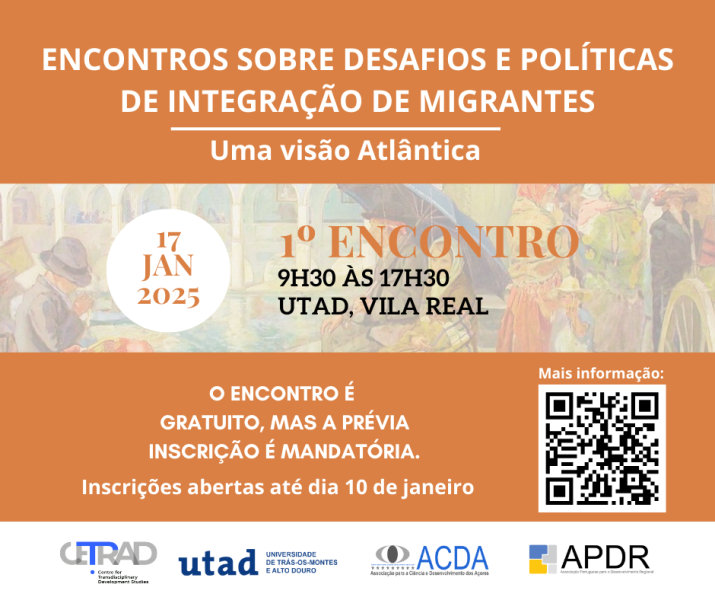1st MEETING ON CHALLENGES AND POLICIES FOR MIGRANT INTEGRATION: An Atlantic vision, January 17, 2025, Vila Real, Portugal

Venue: Universidade de Trás-os-Montes e Alto Douro (UTAD), Vila Real, Portugal
MEETINGS ON CHALLENGES AND POLICIES FOR MIGRANT INTEGRATION
An Atlantic vision
Immigration is expanding in Europe, driven by conflicts in Ukraine, Afghanistan, the Middle East and Sahel Africa, and fueled by declining populations, the availability of jobs and a relatively good welfare state in the North, as well as the poverty and social instability in the South. Measured through employment and education, the integration of migrants into European communities has improved (OECD, 2023). However, the integration process is not the same everywhere, especially when all aspects of integration are considered more relevant for second generation migrants.
The assumption is that the integration of migrants is important for the economy, peace and the development of people and places. The principle is that connection and belonging constitute basic human rights, contributing to social justice and equity (Litevsky, et al, 2023).
However, there are several integration models that involve different forms and combinations of cultural maintenance, cultural adaptation and cultural convergence. Immigrant integration need to be deployed over several dimensions: economic integration (such as employment and entrepreneurship); social and cultural Integration (such as language and community participation); institutional Integration (access to public services housing, etc.); and civic and political Integration (such as civic rights and engagement). These processes, according to (Bloemraad et al, 2023), are historically contingent, mediated by institutions and politically constructed, opening paths for certain groups of immigrants, while erecting barriers for others.
The objective of this special session of ERSA Congress is to gather knowledge that reports, analyzes and evaluates evidence of the integration of migrants in relatively more affluent societies in Europe, North American and in cities and places that are relatively more attractive than others. Previous meetings are being promoted https://workshopsmigrantes.weebly.com/ and other sessions will be proposed for NARSC and PRSCO. The expected outcomes are special issues in regional science journals and improvement of migrant integration policies.
References
Bloemraad I, Isso VM, Kymlicka W, Zhou Y-Y (2023) Unpacking immigrant integration: Concepts, mechanisms and context. Background paper to World Development Report 2023: Migrants, Refugees, and Societies.
Haim-Litevsky D, Komemi R, Lipskaya-Velikovsky L (2023) Sense of belonging, meaningful daily participation and well-being: Integrated research. International Journal of Environmental Research and Public Health, 20(5), 4121.
OECD/European Union (2023) Immigrant Integration Indicators 2023, OECD Publishing, Paris
1st MEETING ON CHALLENGES AND POLICIES FOR MIGRANT INTEGRATION
An Atlantic vision
January 17, 2025, University of Trás-os-Montes and Alto Douro (UTAD)
See full program at: https://workshopsmigrantes.weebly.com/encontro-1.html
All Dates
- 17/01/2025
Powered by iCagenda
About Us
The Regional Science Association International (RSAI), founded in 1954, is an international community of scholars interested in the regional impacts of national or global processes of economic and social change.
